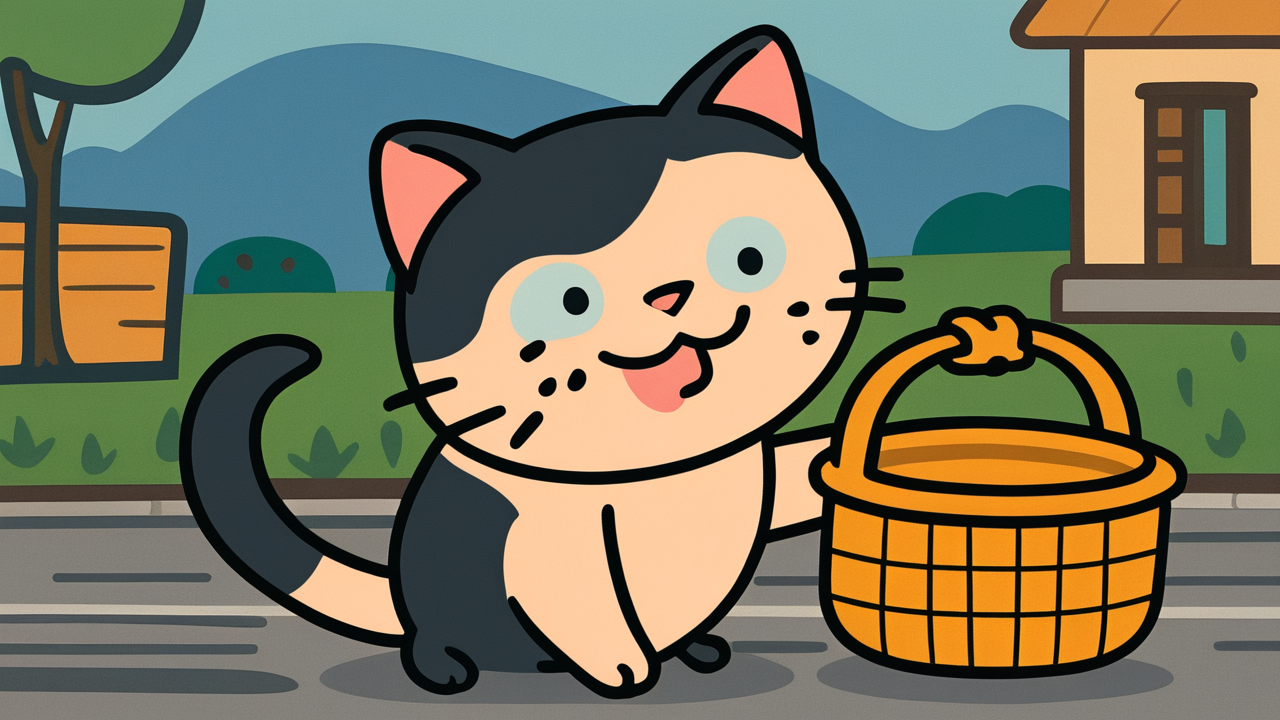How to Read “皿嘗めた猫が科を負う”
Sara nameta neko ga toga wo ou
Meaning of “皿嘗めた猫が科を負う”
This proverb represents “the natural retribution or responsibility that a wrongdoer receives when their misdeeds are discovered.”
The act of licking a plate is natural behavior for a cat, but from a human perspective, it is viewed as “something that shouldn’t be done.” And “bearing the punishment” means taking on guilt or responsibility as a result of that action. In other words, it contains the lesson that even if you do something bad in secret, it will eventually be exposed and you will be held accountable accordingly.
The situations where this proverb is used are when someone commits fraud or wrongdoing, and then it comes to light and they are held responsible. It is particularly used when something the person thought “wouldn’t be discovered” is revealed. Even today, we can understand this expression’s meaning of “natural retribution” when applied to politicians whose corruption is exposed or corporate scandals.
Origin and Etymology
When I researched the origin of this proverb, I discovered that the expression “The cat that licked the plate bears the punishment” is actually not found in general dictionaries or literature. This is an interesting discovery.
It may be an expression that arose from confusion with more common proverbs like “The cat that licked the plate covers its cheeks” or “The thief is brazen.” The old expression “bearing punishment” was used to mean taking on guilt or responsibility.
Imagine the lives of common people in the Edo period. At that time, cats licking plates was an everyday sight. However, people probably passed down various expressions about the cat’s attitude when this was discovered.
The word “ka” (punishment) is not used much in modern times, but in the past it was read as “toga” and meant guilt or fault. It was a formal word that was also used as legal terminology.
While it’s unclear exactly when this proverb began to be used, it may reflect the richness of Japanese linguistic sensibility in expressing the relationship between cats and humans, and the psychology when misdeeds are exposed.
Usage Examples
- That politician also ended up in a situation where the cat that licked the plate bears the punishment
- The subordinate who was secretly slacking off was caught by the boss – truly a case of the cat that licked the plate bears the punishment
Modern Interpretation
In modern society, the meaning of this proverb takes on more complex aspects. This is because in the information age, the very concept of “secretly committed wrongdoing” has changed dramatically.
Through social media, surveillance cameras, and digital records, actions that once might have seemed “unseen by anyone” now easily remain as evidence. With corporate whistleblowing systems and the ease of anonymous information sharing, even small improprieties like “licking the plate” are more likely to be discovered.
On the other hand, in modern times, values about “what constitutes wrongdoing” have also diversified. Actions that were once considered normal may now be problematic. The scope of actions that should “bear punishment” has expanded with the times, including power harassment, sexual harassment, and lack of consideration for environmental issues.
Moreover, in internet society, small individual mistakes can lead to major social sanctions in the form of “online shaming.” This may be a new form of accountability that goes beyond the traditional concept of “bearing punishment.”
However, at the same time, we need the ability to distinguish between true justice and mere collective psychological sanctions. Perhaps we modern people need to think more deeply about the essence of this proverb – “taking appropriate responsibility.”
When AI Hears This
A cat licking a plate perfectly embodies what psychology calls “probability weighting function distortion.” Humans tend to underestimate low-probability risks and become fixated on small immediate rewards, and cats display this exact same cognitive pattern.
They focus on the “guaranteed small gain” of leftover food scraps on the plate while underestimating the “low-probability but significant loss” of being caught and scolded by their owner. This is precisely the “availability heuristic” that behavioral economist Kahneman identified. The food in front of them is concrete and vivid, while future punishment remains abstract and hard to imagine.
What’s fascinating is that this identical phenomenon occurs in modern investment psychology. It mirrors the classic “prospect theory” example where day traders repeatedly lock in small profits while ultimately suffering major losses. It’s the same pattern as being attracted to small dividends from high-risk stocks, only to end up significantly damaging one’s principal investment.
People in the Edo period, through observing cat behavior, had already identified this universal cognitive bias of “disregarding future major loss risks for immediate small gains.” They had derived from everyday animal observation the very essence of human psychology that modern behavioral economics took centuries to unravel.
Lessons for Today
What this proverb teaches us today is the universal truth that “actions always come with responsibility.” However, this is not something to be feared.
Rather, let’s view this lesson positively. Taking responsibility for your actions also means living your life proactively. When you’re about to succumb to small temptations, remembering this proverb might help you make better choices.
In modern society, information transparency has increased, and our actions are seen by more people. This is precisely why the value of acting with integrity in daily life has increased. Rather than “acting correctly because we’re being watched,” we should aim for a state where “acting correctly comes naturally.”
Also, if we do make mistakes, having the courage to “bear the punishment” is important. By accepting responsibility, we can restore trust from others and grow ourselves. This proverb may be teaching us a way of life that values sincerity rather than seeking perfection.



Comments